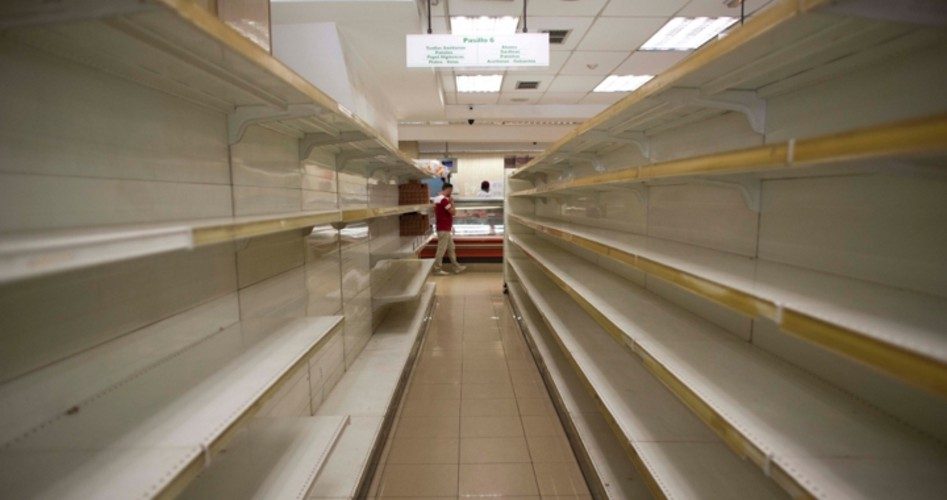
When Venezuela’s legitimate but outlawed National Assembly reported on the country’s runaway inflation numbers last week, the statistics were so astronomical that few could relate to them. Prices increased by 67 percent in March, 453 percent in the first quarter, and 8,878 percent over the last year.
Marxist Nicolás Maduro’s socialist government stopped reporting on those price increases two years ago, and he has sharply criticized any efforts by the National Assembly or websites such as Dolartoday.com since then to tell the truth. A spokesman for the National Assembly, Congressman Rafael Guzman, told a press conference that the runaway prices are beyond the control of the government:
This means that the financial crisis has overwhelmed the Government. The Government isn’t interested in putting the brakes on inflation in order to help the Venezuelan people recover their purchasing power. We continue living with hyperinflation and there aren’t any government policies to stop it.
Guzman then pulled out a huge pile of the country’s currency, the bolívar fuerte (“strong bolivar”), that it would take to purchase a single American dollar bill. He explained that price tags are missing in stores that still have something to sell because prices are changing so quickly. He explained further that store owners are using scales to weigh out the currency but often the scales themselves break down when the weight exceeds their limits.
Translating wages paid in bolívars (Bs.F., or Bs.) into dollars is a dicey business simply because prices are changing so quickly. When workers at Venezuela’s state-owned oil company demanded that they be paid in dollars instead of Bs.F. earlier this month, their average monthly wage was about 8.8 million Bs.F., or about $14 American. By the time this article is published, it’s more than likely those wages will top 10 million Bs.F. a month but with the same purchasing power: $14.
All of which is nice to know but almost entirely useless in understanding precisely what is happening on the ground in Venezuela. A Venezuelan citizen, J.G. Martinez, wrote a letter to The Organic Prepper website on Monday explaining just how locals are dealing with the worthless currency. He opened his letter by warning that this is what Americans “could expect in a hyperinflationary scenario.” He wrote:
Salaries stopped being useful for buying anything other than food….
One Bolivar is worth 0.000020 USD. The minimum wage is $5.21 or 1,800,000 Bs for a month. Now, how could we expect someone to live under these conditions?
Martinez then listed current prices for common commodities and foodstuffs, prices which by now have no doubt jumped considerably:
Vegetable oil, 900 ml bottle, 748,000 Bs
Wheat flour, 1 kg, 398,000 Bs
Cheese, 1 kg, 2,160,950 Bs (yes, TWO MILLION)
Oatmeal, 400 grams, 550,000 Bs
Margarine, 1 kg, 747,000 Bs
Ladies’ deodorant, 890,000 Bs
Mayonnaise, 910 grams, 955,000 Bs
Two toilet paper rolls, 399,000 Bs
Light bulb, 935,000 Bs
Shoes, 5,989,000 Bs
Martinez noted that not only has the supply chain been totally disrupted by Maduro’s war against the free market, but that Maduro has ordered his military service to distribute what’s available. His military services are starving along with the citizenry and so they have further disrupted the flow by redirecting those commodities that are still available to street gangs in exchange for part of the products. Those commodities are then sold by the gangs on the black market at multiples of the prices fixed by the government. As Martinez explained:
The main problem arises because it is the military taking over the supply chain. They have an agreement with the gangs, and they deviate [reroute] the production of the plants that are under military control, to the street sales. The gangs are armed, and they protect the retail sellers from thieves and turmoil. This is in the most populated cities, where the money is, and therefore the products don’t make it so often up to the smaller towns.
As is always the case when currency is destroyed by government printing presses, a black market springs up. It’s the free market but referred to by anti-capitalists as “black,” somehow intimating that it’s bad. Here again Martinez tells the truth: “The black market offers of tires, food, car spares, engine oil, and all kind of medicines and goods are rampant, and the social networks are full of resellers.”
He tells of an embarrassing moment when he tried to purchase an item but learned at the last minute that the price had increased so much that he couldn’t make the simplest purchase: “I asked a granny how much she was charging for some hand towels she had for sale, [but] I did not have enough money in my pocket to buy even one towel…. I apologized but saw she was upset. It was a sad, awkward moment indeed.”
Who survives in such an environment? Answered Martinez:
Someone with manual, valuable skills, [who] could provide basic goods or services, will be able to survive. They will just adjust their prices … and if the customer can´t pay, then most likely they will trade in their service for something to barter. People with low maintenance trucks that have received meat as payment in a farm for transporting a load of hay (many farmers have to buy hay down here in the dry season because they don´t have the machines to compact it and there is no rain for the pastures to grow). They exchange the remaining meat for cheese, poultry, and fish. Or the electrician like my dad got paid with half a pork for one day of work at his friend´s farm rewiring an old corn mill. He took the excess as a gift to one of my cousins, and got back 6 kgs of pasta, and 2 of sugar.
Who doesn’t survive? Said Martinez:
The hardworking father of three, with a minimum wage, is starving, and watching their family starve too. Some of them quit their jobs and started a life of crime. Other ones leave their families behind and don’t come back. Others have been kind enough to tell their families that they will be in this or that country, and never appear again.
Many have committed suicide.
Elders do it because they don’t want to be a burden nor an additional weight for their family.
Youngsters because they don’t see themselves [surviving] in such an apocalyptical scenario.
Martinez ended his letter to the Organic Prepper by saying, “And this, ladies and gentlemen, is what hyperinflation and a collapsed society looks like. May God bless us and protect us all.”
Every currency that is not redeemable in specie, including Federal Reserve Notes masquerading as the American dollar, is subject to the same risk and eventual ruin. In his The Mystery of Banking, Professor Murray Rothbard wrote about the 1923 runaway inflation inflicted by similar policies on the trusting, unsuspecting, and unprepared German people:
By the later months of 1923, the German mark suffered from an accelerating spiral of hyperinflation: the German government (Reichsbank) poured out ever-greater quantities of paper money which the public got rid of as fast as possible. In July 1914, the German mark had been worth approximately 25 cents. By November 1923, the mark had depreciated so terrifyingly that it took 4.2 trillion marks to purchase one dollar (in contrast to 25.3 billion marks to the dollar only the month before).
It was only until the government stopped the printing presses that sanity was restored. Wrote Rothbard: “How did Germany get out of its runaway inflation? Only when the government resolved to stop monetary inflation, and to take steps dramatic enough to convince the inflation-wracked German public that it was serious about it.”
Photo of empty supermarket shelves in Caracas, Venezuela: AP Images
An Ivy League graduate and former investment advisor, Bob is a regular contributor to The New American magazine and blogs frequently at LightFromTheRight.com, primarily on economics and politics. He can be reached at [email protected].



